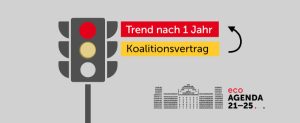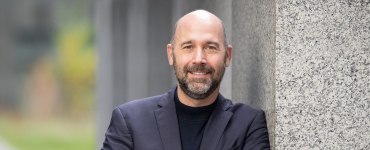The Association of the Internet Industry has just undertaken a 10-point check and has found that, one year after its inauguration, the traffic light coalition has only made real progress on realising its digital policy goals in the field of digital infrastructure. The digital budget, digital administration and sustainable digitalisation are at a standstill. When it comes to cybersecurity, the traffic light coalition is currently even moving away from its agreement, and when it comes to data retention, it is still at odds and needs to adopt a political course. This is likewise mirrored in the population’s perception: the digital policy opinion barometer by eco and Civey shows increasing dissatisfaction and the desire for more digital transformation.
Digital policy 10-point check
An Overview of the 10-Point Check
-

Digital policy responsibilities
The business distribution plan of the Federal Chancellery leads to the fragmentation of digital policy issues through different lead responsibilites on the part of the Federal Ministry of Economic Affairs and Climate Action (BMDV), the Federal Ministry of the Interior (BMWK) and the Federal Ministry of the Interior (BMI).
-

Digital Strategy
The Digital Strategy presented by the German federal government has set concrete targets and strategic goals in some instances, but has not been equally ambitious or sufficiently far-reaching in all fields. The announced digital budget has not yet been created.
-

Digital Infrastructure
The German government's Gigabit Strategy was adopted in July 2022 to optimise the promotion of fibre optics. An analysis of private-sector roll-out and funding requirements is currently being carried out. The first roll-out stage of the Gigabit Land Register is to be published by the end of December. There is still uncertainty about the definition of full public financing and the exclusion of "non-reliable companies" from the roll-out.
-

Sustainable Digitalisation
The planned Energy Efficiency Act could lead to an exodus of the data centre industry to other countries. The planned electricity price brake will also confront operators with contradictory regulatory approaches. While the Act classifies data centres as energy-intensive, the price brake currently does not take the industry into account. The traffic light coalition must roll out renewable energies on a massive scale and make sufficient green electricity available on the market.
-

Data retention
In its coalition agreement, the CDU/CSU had opposed data retention. After the ECJ ruling on German regulations, it is now conflicted. This threatens to derail expectations of a quick end to data retention. The first thing to do is to make a fundamental political decision and reassess the legal obligation to retain data.
-

Cybersecurity
Developments in the field of cybersecurity are currently unclear. The cybersecurity agenda presented by the German Federal Ministry of the Interior (BMI) indicates a departure from the goals stipulated in the coalition agreement. The cybersecurity agenda contains demands and measures that are detrimental regarding the goal of introducing more encryption in Germany.
-

European Internet Policy
The EU DSA and DMA acts are already partly underway. In the course of the upcoming Digital Services Act - the German transposition of the DSA - the German Network Enforcement Act (NetzDG) is also to be largely repealed. There are still open questions here about surveillance and controls. With the new CSAM regulation, however, there are activities at the European level that threaten the notice and takedown principle. It remains to be seen how the traffic light coalition will position itself on this topic.
-

Data usage
With its Data Strategy, the traffic light coalition aims to improve data provision, promote data-driven business models and further develop innovation-friendly regulation. The proportion of data-driven business models in Germany is still low. With the planned data institute, a framework for the development of common standards and best practices can be created.
-

New Work
In the field of New Work, the traffic light coalition has made little progress. The introduction of a written form specification for employment contracts via the Evidence Act in the transposition of an EU directive raises questions as to whether the intended goal is actually being pursued.
-

Digital State
The implementation of the Online Access Act falls far short of expectations. The digitalisation of administrative services and the easing of bureaucracy are making only slow progress. In the area of digital education, the Digital Pact for Schools 2.0 has not yet been further concretised.
In its coalition agreement, the German federal government set itself ambitious digital policy goals. However, the 10-point check on the traffic light coalition system undertaken by eco – Association of the Internet Industry reveals that, after one year of government, these goals have largely not been met. From the eco Association's point of view, five out of ten digital policy projects are marked red because they are either at a standstill, fall short of the goals set in the coalition agreement, or a political course must first be set. These include the allocation of digital responsibilities, a Digital Strategy and budget, data retention, as well as the topics of digital sustainability and the Digital State.
It is only in the area of digital infrastructure that the eco Association sees a green light for digitalisation. According to eco, there are no clear trends yet in the areas of data usage, New Work and European Internet policy, meaning that the traffic light here is set to yellow. The evaluation of all ten digital policy topics is available for download here.
A representative Civey survey commissioned by eco shows that the German federal government's digital transformation is not moving fast enough for the majority of Germans: around 72 per cent would like the German federal government to more resolutely push digital transformation forward.*
An overview of the topics
- Digital policy responsibilities
- Digital Strategy
- Digital infrastructure
- Sustainable digitalisation
- Data retention
- Cybersecurity
- European Network Policy
- Data usage
- New Work
- Digital State
Digital budget at a standstill
eco Chair of the Board Oliver Süme sees a root problem being that unclear digital responsibilities would slow down the traffic light coalition’s Internet policy. This can also be seen in the Digital Strategy. “While the Digital Strategy has been published, it remains unclear as to how the respective targets are to be implemented in concrete terms,” says Süme. “A forward-looking digital policy must not allow itself to be ground down between the bureaucratic squabbling between different departments.” An additional brake on Internet policy projects is the fact that the traffic light coalition has still not created the promised digital budget.
Annual trend: growing desire for digitalised administration
Süme also sees deficits and an urgent need for action in the field of digital administration. In his view, the implementation of the Online Access Act falls far short of expectations. The digitalisation of administrative services and the easing of bureaucracy are making only slow progress.
The desire for a digitalised administration has also grown among the population in the past year, as is shown by the Digital Policy Opinion Barometer** by eco and Civey: Whereas before the Bundestag elections in September 2021, around 38 per cent of respondents had stated that there was a particularly urgent need for the traffic light coalition to tackle the digital transformation of public authorities, by November 2022 this figure had risen to approximately 43 per cent. Simultaneously, only three per cent of respondents were satisfied with the status of digital administration in their federal state.
Digital policy barometer: More than 98 per cent dissatisfied when it comes to cybersecurity
From the public’s point of view, however, the area of cybersecurity is performing even more poorly: here, the satisfaction ratings have slipped from 3.4 to 1.6 per cent since September 2021. Most recently, just under one in two said that cybersecurity was the German federal government’s most urgent digital policy task. Before the Bundestag election, this was still stated by about one in three.
“The war in Ukraine also means that there is a need for action in the field of cybersecurity; the concern about worldwide hacker attacks has also caught on with the people in Germany,” says Süme. At the same time, the cybersecurity agenda presented by the German Federal Ministry of the Interior (BMI) points to a departure from the goals stipulated in the coalition agreement. Süme: “The cybersecurity agenda contains demands and measures that are detrimental regarding the goal of introducing more encryption in Germany.”
Sustainable digitalisation: the traffic light coalition must make more green electricity available on the market
On the subject of sustainable digitalisation, the German federal government has also recently become entangled with conflicting regulatory approaches: While the Energy Efficiency Act classifies data centres as energy-intensive and therefore even prescribes special regulations for these centres, the industry is currently not taken into account in the electricity price brake. “Data centres form the foundation of digital transformation and can offer sufficient sustainability potential solely through the utilisation of waste heat,” says Süme. “But if the traffic light coalition does not create a market of waste heat consumers and provide operators with sufficient green electricity, I unfortunately see red here.”
Meanwhile, more than one in two people in Germany share the opinion that, in the face of the energy crisis, the German federal government should support the operators of critical infrastructures such as data centres more strongly than it has so far.***
Digital infrastructure: Gigabit roll-out to take shape quickly
What is good to know is that there have also been improvements in the field of digital infrastructures under the traffic light coalition. With its Gigabit Strategy published in July 2022 and the development of the Gigabit Land Register, the traffic light coalition has come much closer to its goal of accelerating the roll-out of gigabit-capable infrastructure, says Oliver Süme. A potential analysis of private-sector roll-out and funding requirements is currently being carried out. The first roll-out stage of the Gigabit Land Register is to be published in December 2022.
This trend is also mirrored in the opinion of the population: while the roll-out of digital infrastructure was still clearly at the top of the Germans’ digital policy wish list before the Bundestag elections (52.8 per cent), this topic area now ranks third behind cybersecurity and digital administration. Satisfaction ratings for the roll-out of digital infrastructures have also grown from 4.3 to 10.5 per cent since September 2021.
Süme: “Overall, I have the distinct impression that the German federal government has recognised digitalisation as a key challenge and is making efforts to implement it against the backdrop of global developments and challenges. However, I would like to see stronger coordination between the ministries and a more strategic inclusion of digital solution potentials for current challenges, such as dealing with the advancing climate change.”
* The market and opinion research institute Civey was commissioned by the eco Association to survey around 2,500 people between 28 and 29 November 2022. The results are representative of the citizens of the Federal Republic of Germany aged 18 and over. The statistical error is 3.5 per cent.
*** The market and opinion research institute Civey was commissioned by the eco Association to survey around 2,500 people between 28 and 29 November 2022. The results are representative of the citizens of the Federal Republic of Germany aged 18 and over. The statistical error is 3.5 per cent.
** With the Digital Political Opinion Barometer, the market and opinion research institute Civey was commissioned by the eco Association to survey around 5,000 people in the period from 24 February to 29 September 2021 and in the period from 7 April to 8 November 2022. The results are representative of citizens of the Federal Republic of Germany over the age of 18. The statistical error is 2.5 per cent.




